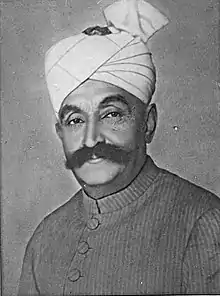Abdul Majid Khan Tarin
Khan Abdul Majid Khan Tarin (also spelt Abdul Majeed Khan) (1877–1939), Khan-Sahib,[1] OBE,[2] was a prominent magistrate, MLA and philanthropist of the North West Frontier Province of former British India.[3]

Early life and education
He was born to a prominent Pathan[4] landlord and aristocrat from Hazara Division, Muhammad Habib Khan Tarin (or Tareen), (c.1829/30-Dec.1888), Hon. Nawab Bahadur, Risaldar, CSI, who was also an ex-cavalry officer[5] and a landed jagirdar of Talokar and Dheri estates in Haripur, NWFP (present-day, Khyber Pakhtunkhwa).[6] At his father's death Majid Khan was a young boy and the family estates were placed under the Court of Wards.[7][8] He was initially taught at home by English tutors, then sent to the Aitchison College, Lahore, and then to a mission school in Simla. After his Matriculation from there he proceeded to England in 1899 and qualified as a barrister in 1901.[9] He was called to the Bar at Lincoln's Inn in April 1902.[10]
Career
On returning to India, he became a Junior Magistrate in the Punjab service, then a 1st Class Magistrate, Extra Assistant Commissioner and then Deputy Commissioner; he also served briefly as a Judge in the Punjab Sessions Courts[11] and on retiring from service in 1934, he became an early and active member of the NWFP (now Khyber-Pakhtunkhwa in Pakistan) chapter of the All India Muslim League and a close associate of Sir Sahibzada Abdul Qayyum, also serving as a Member of the NWFP Legislative Assembly (1937–1939).[12] Although keen to protect Muslim rights, he remained a firm proponent of a consolidated Muslim entity within a larger Indian confederation, till the end. He died at his ancestral village, Talokar, in June 1939.[13]
Legacy
Khan Sahib Abdul Majid Khan Tarin was also a very active philanthropist. Apart from his support of the establishment of the Islamia College, Peshawar, and support to various Indian Muslim charities, he played a considerable role in the early development of his native Haripur area in Hazara, NWFP. He founded several charitable schools, set up a public Tuberculosis ward at the Haripur Government Hospital, provided for a system of educational scholarships for local students as well as supporting numerous needy people.[14] This tradition of public service has been carried on by his family.
Khan Sahib had three sons and two daughters. His eldest son, Abdus Salim Khan, a noted Pakistani diplomat,[15] was married to the well-known former Pakistani minister, Begum Mahmooda Salim Khan, daughter of the late Punjab Premier, Sardar Sir Sikandar Hayat Khan (1892–1942).[16] His second son Abdul Hamid Khan was an agriculturist of NWFP,[17] whilst his third son, Abdul Rashid Khan, was commissioned in the British Indian Army[18] and later served in the Pakistan Army after the independence of Pakistan in 1947. The Pakistani poet and research scholar, Omer Tarin is a great-grandson of Abdul Majid Khan Tarin.[19]
References
- Title conferred in 1919; see Who's Who in India, 1920 ed
- Awarded in the January 1920 New Years List, see 'Burke's Handbook of the Most Excellent Order of the British Empire', London, 1921, p 650
- Who's Who in the Hazara District, 1932, p.6
- Dr Sher Bahadur Khan Panni, Tareekh e Hazara (Urdu: History of Hazara) 1969 ed, published Peshawar, p.275-76, enlisting Tarin/Tareen origins
- Col. H St GM McRae, Regimental History of the 45th Rattray's Sikhs, Vol 1, Glasgow, 1933, p.136
- O.Tarin & SD Najmuddin, "Sardar Habib Khan, 1st Bengal Military Police Battalion" in Durbar: Journal of the Indian Military Historical Society, UK, Summer 2010, Vol 27, No2, pp. 67-75; also see 45th Rattray's Sikhs, which was originally raised as the 1st Bengal Military Police Btn, 1856
- Indian Princely States and Jagirs website Archived 1 November 2010 at the Wayback Machine
- A younger half-brother of Abdul Majid Khan, Abdul Latif Khan Tarin, later served as a Jemadar e Aazam in the 82nd Punjabis (now 4th Btn the Punjab Regiment), and died in action at the Battle of Dujaila Redoubt, in Mesopotamia, March 1916, World War 1
- His records are available on the Old Rolls of Lincoln's Inn, London, UK
- "Calls to the Bar". The Times. No. 36750. London. 24 April 1902. p. 8.
- 'Punjab Government Gazetteer', 1932
- See Introduction to the early history of the NWFP Assembly Archived 27 June 2017 at the Wayback Machine
- 'The Hazara Enquirer' , Sept 23rd 1939, Obituary notice
- Gazetteer, 1932
- Pakistan Foreign Office Archives, Islamabad; Listings 1952-1962, Ref No 23
- "List of Pakistani women leaders". Archived from the original on 4 May 2013. Retrieved 8 July 2011.
- Hazara Reporter, Monday 19 October 1959, p. 12
- Indian Army List April 1943 ed, informs us that the said 2nd Lieutenant Abdul Rashid Khan was given an Emergency/Wartime Commission, with effect from 14 July 1942, straight from the Indian Military Academy, Dehra Dun.
- Oct 2011 Interview of poet Omer Tarin, by Dr Ilyas Khan. Shared online at http://ilyask2.wordpress.com/2011/11/28/interview-with-poet-omer-tarin-2011/ . Retrieved 6 April 2014